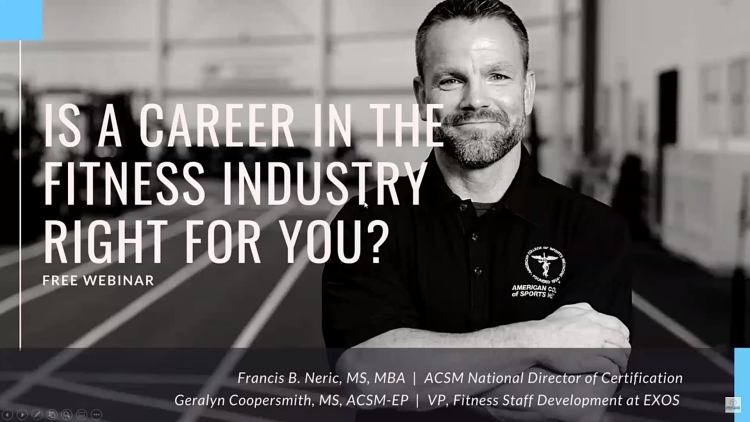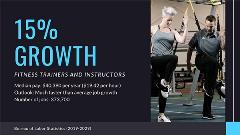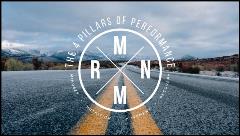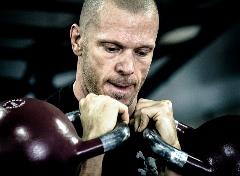Geralyn Coopersmith, MA, and Francis Neric, MS, MBA |
Dec.
8, 2020

ACSM recently hosted a webinar with Geralyn Coopersmith, MA, EXOS VP of Fitness Staff Development, and Francis Neric, MS, MBA, ACSM National Director of Certification, entitled Is a Career in the Fitness Industry Right For You? This is the essential Q&A.

Watch the webinar here
How many continuing education courses are required/recommended as an ACSM-CPT a year?
FRANCIS: ACSM requires a minimum of 45 continuing education credits (CECs) every three years for its Certified Personal Trainers (ACSM-CPT). Each CEC is one contact hour of learning: 45 CEC = 45 hr of learning. ACSM-CPTs do not have to report CECs each year, just by the deadline.
In terms of recommendations, it is better to spread out CECs throughout a 3-year reporting period. This allows you to reduce the cost (typically CECs, depending on the organization, is about $20/CEC) into more manageable chunks. Certificants often will wait until the last minute to recertify and are pressed for time, money, or both. I also recommend have a purpose in selecting your CECs.
Pick an areas that that extends your knowledge, skills, or abilities which allows you to specialize and stand out as a professional. ACSM’s strategic education partners include EXOS, FMS, and USA Weightlifting. EXOS, for example, has courses dedicated to enhancing a client’s athletic that include Multidirectional Speed, Movement Preparation, and Integrating Nutrition into Training. To find out more, visit acsm.org/get-stay-certified and scroll down to the “Development and Career Opportunities” section (on the left side).
Is it looked down upon to get a MS in Exercise Physiology online vs in-person?
FRANCIS: Great question, it depends on employer preference and, more importantly, your career path. Most fitness employers do not have a preference on where you graduated from (in-person or online). Some online programs require or offer opportunities to have directed practice on campus or on-site. The higher the risk or complexity of a client/patient may require you to have direct contact or experience; for example, interpreting a 12-lead ECG of a clinical patient. If a PhD something you are strongly considering in the future, then I would recommend an in-person MS program and selecting a program that conducts research in your particular area of interest.
What you should also consider is that job offers often happen at the end of a successful internship experience. So, finding a program that has a strong internship program is critical. From my conversations with recruiters and hiring managers, 70-80% of their new hires come from their internship program.
On a personal note – have a purpose and plan before applying to a master’s program. In today’s job market, I would strongly recommend getting a master’s that is complementary to and/or enhances to your ability to practice. For example, having a bachelor’s in Exercise Science, Certified Exercise Physiologist, a master’s Nutrition, and being a registered dietitian allows you to have multiple practice areas. For the same reason, I got my MBA not only because I was interested in business and business development, but it also widened my career opportunities in management and leadership.

View the ACSM and EXOS Webinar with Performance Specialist Tristan Rice
Where is the best place to begin getting experience for jobs in team athletics? Is personal training most people’s initiation in the field?
GERALYN: A lot of people I know who wanted to work in team sports, became ACT (Certified Athletic Trainers) in their undergraduate studies and got in that way. Others (with different backgrounds) interned wherever they could to get experience and often that experience turned into a job either at the same place or elsewhere.
Can I share this webinar with my Freshman in Exercise Science? I think it is very positive and encouraging as they try to figure out the direction they want to go within the field.
FRANCIS: Absolutely! You can also reach out to me (fneric@acsm.org) and I can do presentations to your students.
Thoughts on if ACSM, or related organizations, making certification or CON-ED course vouchers part of the cost of an academic textbook cost?
FRANCIS: Not yet, but we can certainly look into this. Great idea!
Is there a career path to merge nursing and fitness?
GERALYN: ANSWERED LIVE
What does a Personal Trainer's typical workday look like? … exercise physiologist look like?
GERALYN: ANSWERED LIVE
Which are the top 5 (recommendations) to (help) your company grow?
GERALYN: ANSWERED LIVE
View More Popular Content

ACSM Guidelines Resources and Downloads

Personal Training Resources and Downloads